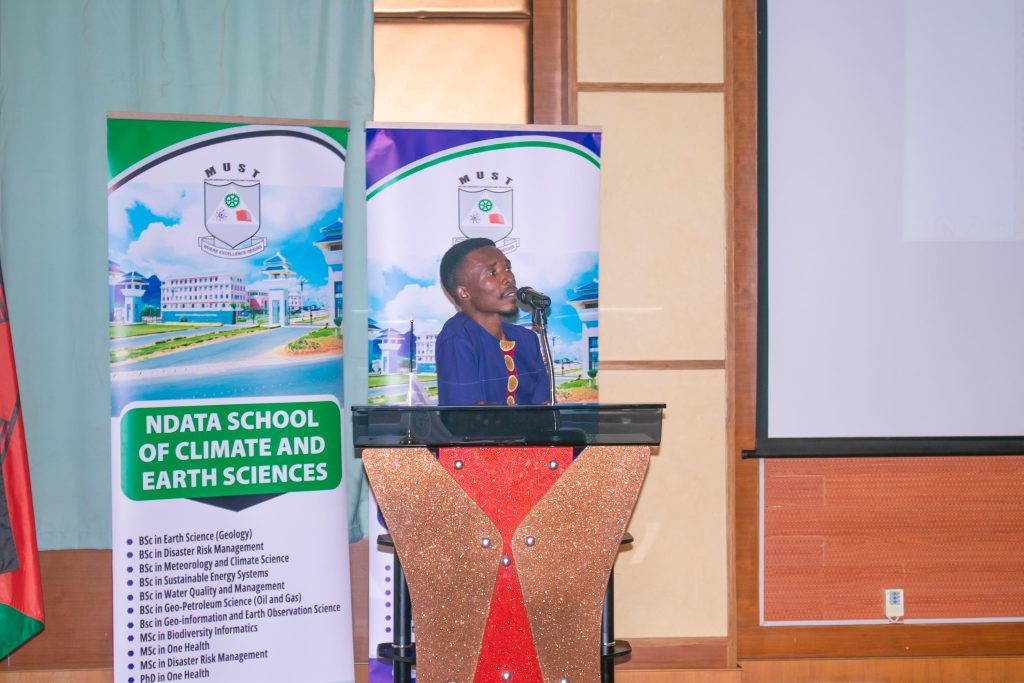By Ali Kamutsitsi Ngude
The Cultural Research & Innovation Symposium hosted by the Bingu School of Culture & Heritage (BSCH) at the Malawi University of Science & Technology (MUST) today, featured a thought-provoking presentation by Sankofa Kasompha from the Lost History Foundation (LHF). The Cultural Research & Innovation Symposium, which attracted scholars, researchers, and cultural enthusiasts, focused on the role of culture in driving innovation and technological advancement.

Sankofa Kasompha’s presentation, titled “How Can Indigenous Spirituality Be a Catalyst for Innovation and Technological Advancement in an African Country,” highlighted the profound connection between African spirituality and sustainable development. The presentation underscored the importance of integrating indigenous spiritual systems into modern technology, emphasizing that the African spiritual systems have long informed practices in agriculture, medicine, and environmental stewardship.
He stressed that indigenous spirituality is deeply intertwined with how African societies approach the world, offering alternative perspectives that drive innovation. “Unlike purely secular frameworks, spirituality within many African cultures creates a mindset that is holistic and cyclical, emphasizing harmony between humans, nature, and the cosmos. This worldview has the potential to inspire innovative solutions that are sustainable, community-centered, and respectful of natural resources”.
He further highlighted that indigenous spiritual beliefs often emphasize a deep respect for nature, which leads to sustainable practices in resource management. He then illustrated how traditional agricultural methods rooted in spirituality, such as agroforestry and permaculture, can inspire modern sustainable farming technologies that are essential for combating climate change. “For instance, many African communities have spiritual taboos against overharvesting resources, hunting certain animals, or polluting sacred rivers. In today’s context, these beliefs could influence the development of green technologies, including water purification systems, sustainable forestry technologies, and eco-friendly energy solutions”
A sub topic on indigenous rituals and innovation was another focal point of Sankofa Kasompha’s presentation. He stated that indigenous rituals often invoke creativity and a deep connection with natural elements, fostering a mindset open to new ideas and innovative solutions. “For instance, rituals linked to the harvest season or rainmaking are not just spiritual practices but are embedded with practical knowledge about weather patterns, soil fertility, and seasonal changes. These insights can inspire climate-adaptive innovations.”
Among the highlights of the event was a keynote address delivered by Senior Chief Kapeni of Blantyre who stressed the importance of preserving Malawian culture as the foundation of national identity and ethical living. He urged students to remember to stay true to themselves as Malawians and embrace their cultural heritage with pride.
The symposium also featured other presentations which included:
- Prof. Fanuel Lampiao from Kamuzu University of Health Sciences delivered a presentation on the contribution of indigenous knowledge to solving medical conditions, showcasing how traditional healing methods can complement modern medical science.
- Dr. Tabitha Nindi Chigwa from MUST presented on the importance of anchoring research in culture, emphasizing that cultural context should be a foundation in academic inquiry to ensure relevance and applicability in African societies.
- Prof. Makuwira from MUST explored re-contextualizing culture in a science and technology university, advocating for the integration of cultural studies within science and technology education to foster a more holistic and inclusive approach to innovation.
Other distinguished faces at the symposium included a scholar and former Minister of Finance, Dr. Ken Lipenga (PhD), as well as Senior Chief Ngabu of Chikwawa.
The symposium concluded with a call for greater collaboration between scholars, policymakers, and innovators to embrace indigenous knowledge systems as vital resources for driving sustainable development and technological progress in Africa. The insights shared at this symposium highlighted the need to elevate culture as powerful tools for innovation in addressing modern-day challenges.
